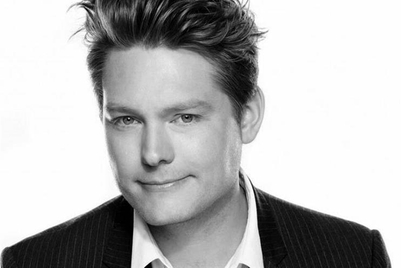.png&h=570&w=855&q=100&v=20250320&c=1)
Marketers are increasingly out of touch, jealous of people with “real jobs,” and terrified that marketing is actually simple, according to marketing consultant and sought-after global keynote speaker Tom Goodwin.
“There's a vulnerability to simplicity. I think it takes quite a lot of courage to say, ‘This isn't as hard as everyone says it is,’” Goodwin told Campaign Asia on why he believes marketers are overcomplicating the discipline.
“People tend to follow the path of least resistance and they nod when people say things and they agree with each other in meetings, just because it's a lot of work and it takes courage [to disagree].”
Goodwin, co-founder of consultancy All We Have is Now and former head of futures and insights at Publicis Groupe, made these comments at the recently concluded Association for Data-driven Marketing and Advertising’s (ADMA) Global Forum in Sydney following his keynote session.
Goodwin claimed he never hears people ask, “Does this matter?” in the meetings he’s in, which means nobody is acting as the voice of the customer. Asking this question used to be the agency’s job, but agencies have fallen away from embodying the customer, too, he argued. Instead, the industry largely smiles and nods even at what Goodwin calls “nonsensical” claims.
“Procter and Gamble went on the stage a long time ago and said we need one-on-one conversations with consumers and everyone took that and they went around saying it. It’s nonsense. They're a mass brand.
“People say things like ‘consumers want relationships with brands’. People say that people love brands and they're ambassadors for brands. There's a lot of nonsensical stuff that we like saying just because it kind of feels right.”
Goodwin used these examples to illustrate a broader point: that in the search for sophistication, “we’ve lost common sense” and developed an over-reliance on metrics, many of which he contends are unhelpful. He told Campaign Asia that you can’t measure the value of “expensive granite” used in Aesop stores or the luxurious beds found in Four Seasons hotel rooms, but these simple choices have a profound impact on brand perception.
Michelle Klein, the chief customer and marketing officer at insurance company IAG, agreed with Goodwin—marketers need to simplify, and go back to “doing the basics brilliantly”.
“I actually really agree with what he was saying … the complexity comes when you don't have that clarity around the outcome that you're trying to drive,” Klein told Campaign Asia.
“I love to talk about the theory of Occam's razor. The simplest solution is the answer. It's often in front of you.”
Goodwin acknowledged that it’s “really difficult” for CMOs to sell unmeasurable instincts to their CEOs and CFOs, especially as marketing budgets are scrutinised and slashed amidst economic pressures. But CEOs have to trust the people they’ve hired, he argued.
“I feel like I'm quite annoying when I say these things, because it does seem like I'm very removed from reality,” he started.
“But, I mean, if we don't trust people to be good at their jobs, then why would we recruit them? At some point, we have to say, ‘Enough is enough. I'm going to give you data where I can. I'm going to give you a business case where I can.’”
Goodwin pointed out that the biggest decisions people face, like choosing a partner, can’t be justified in a spreadsheet. “At some point, we just have to go, ‘I came into this career because I was good at it and because I was curious and because I thought I understood people. I'm now quite senior and you probably recruited me, so just have faith in my ability to make decisions.
“‘Let's monitor progress, let's have a regular cadence of meetings where we discuss what's happening. But it may take a long time and it may work in ways that we can't really see and we don't even understand.’”
It’s this level of subjectivity that means marketers are often jealous of people with ‘real jobs’, he said. Because “we're working with people and we're working with ideas and we're trying to understand change in the world”, marketing is led by psychology and emotion, versus hard facts. He likened marketing to a history exam against a maths exam in which it’s possible to objectively score 100%.
“Somehow it's more satisfying at times to do something which is highly objective, because you know you’re right.”
In his keynote, Goodwin also argued that digital advertising is still largely underwhelming—“I can’t in good faith say I see a lot of [good] examples … Apple is probably the closest”—and that brand and performance sit in siloes, which only reduces the impact of both. Separately, they are both as “implausible as the other”, he claimed, saying the language brand fanatics use sounds like that of a “religious cult”.
Brand teams sit separately from performance teams and attend different meetings, he added, and are kept apart because the easiest way to cope with change is to create a new department, leading to data, performance, and AI divisions in agencies and brands. He predicted the danger of marketers failing to simplify, and bring brand and performance together, will mean short-termism only intensifies, especially as “increasingly, brand money is harder and harder to justify.”
“The danger is that, over time, we become so impatient and … the amount of evidence required to do something becomes so great that effectively everything becomes performance, and then we'll see brand advertising diminish.”
Whether Goodwin’s call for simplicity and trust will resonate with the industry remains to be seen. However, his observations about the current state of marketing raise questions about the balance between data, intuition, and the ever-elusive human element in driving brand success.




.jpg&h=334&w=500&q=100&v=20250320&c=1)
.jpg&h=334&w=500&q=100&v=20250320&c=1)



.jpg&h=334&w=500&q=100&v=20250320&c=1)
.png&h=334&w=500&q=100&v=20250320&c=1)


.jpg&h=268&w=401&q=100&v=20250320&c=1)


